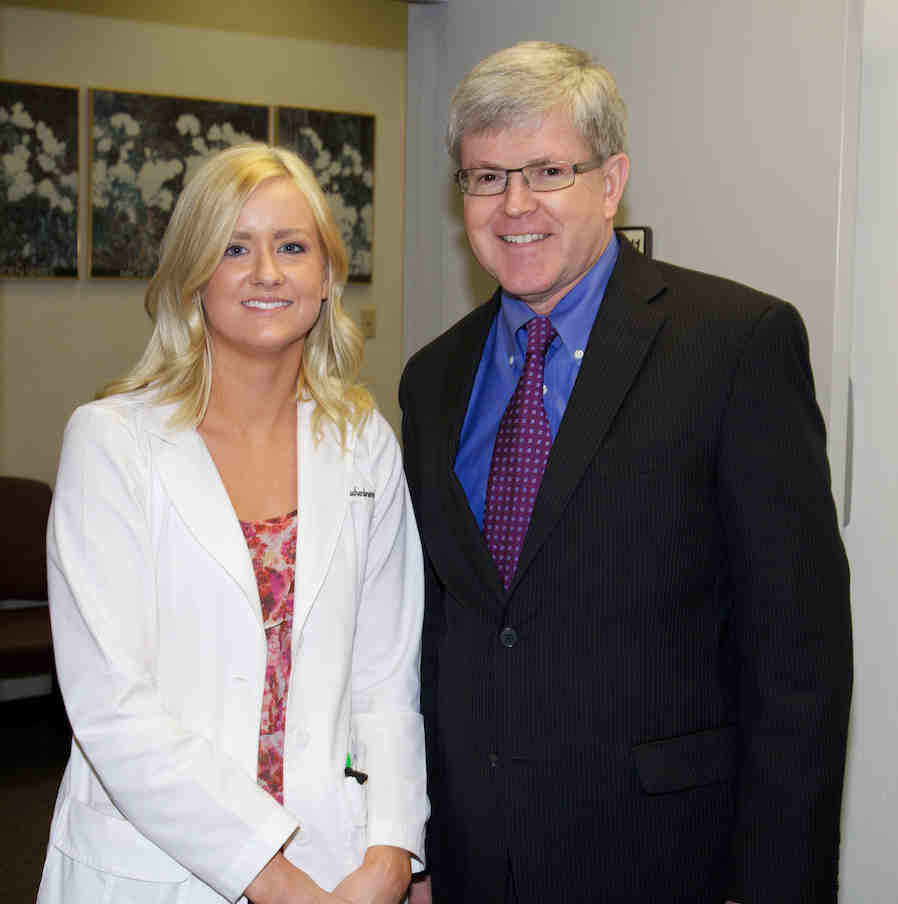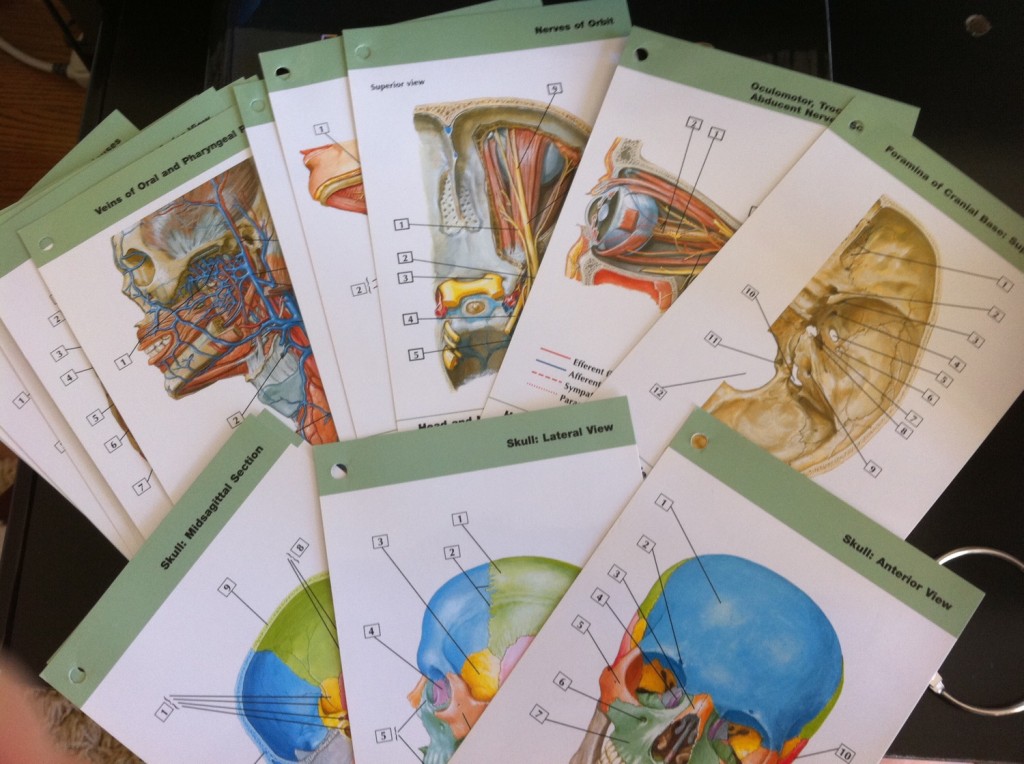June 2012 Optometry Student of the Month
Name: Mallori Aschenbrenner
School: SCCO
Year: 2013
1. Congrats on winning Student of the Month! – Please tell us exactly why you won student of the month? I earned the highest score nationwide on NBEO part 1 (March 2012 administration) and subsequently received the Norman E. Wallis Award for Excellence from the NBEO. I have received academic scholarships for earning the highest GPA in my class during all 3 years at SCCO. I am also excited to be SCCOʼs representative in the 2012 Varilux Student Bowl at Optometryʼs Meeting in Chicago.
2. Can you give a few words of advice to other students out there striving to achieve certain goals while in Optometry school? When I reflect on my experiences at Optometry school, I think prioritizing and time management were huge keys to my academic success. I always kept important events or due dates in the back of my mind, but I tried to concentrate on one thing at a time. The schedule during Optometry school can become difficult to manage, so taking it day by day prevented me from becoming overwhelmed. Also, I think itʼs important to make time for normal social activities like hanging out with friends and family.
3. Where are you from, where did you attend undergrad? Iʼm originally from a small town in North Dakota called Watford City, but I graduated high school in Minot, ND, where I also attended college at Minot State University.
4. What did you study in undergrad, and what ultimately drove you to Optometry? I earned my BA in Biology after deciding at the end of my freshman year that I wanted to pursue optometry. My sister was a student at SCCO while I was weighing my career options, and she made Optometry sound like a perfect fit for me. I was always interested in pursuing a career in healthcare, so it was more about determining the type of lifestyle I wanted and what my future goals were. I also worked as an optician/optometric assistant at a local Optometry office during my last three years at Minot State, so I was sure I would love it!
5. What made you choose your school? I had the opportunity to attend my sisterʼs commencement ceremony at SCCO in 2008 and loved the beautiful campus and SoCal. You canʼt beat being able to wear flip-flops year-round—especially when youʼre from North Dakota. I was also fortunate to have a first-hand perspective from my sister about student life at SCCO.
6. Are you involved in any Optometry organizations, do you hold any special positions at school or have any other creative optometry ventures going on? I try to participate in as many organizations/clubs as I can. I am a member of the AOA, COA, and AOA-PAC. I am a Student Fellow of the AAO and served as SCCOʼs student liaison to the AAO during my second year. I have also held positions on various administrative committees during my time at SCCO and was a student ambassador during my first year.
7. What academic subject have you found most interesting in school thus far? Ocular Disease is my favorite, but Strabismus/Amblyopia was a close second.
8. What was the most difficult class for you thus far? Probably Microbiology/Biochemistry from 1st year. Definitely not my favorite.
9. What was the most difficult clinical skill to learn? Extended BIO/Scleral Depression.
10. If youʼve already started seeing patients in clinic, how did you help make the transition from student to intern? I think the most important things to remember when transitioning from student to intern are 1) Nothing is textbook. 2) Donʼt sweat the small stuff. Over-minusing by a quarter is not going to kill your patient. 3) When in doubt, repeat the test. The patient doesnʼt know you made a mistake unless you tell them. 4) Utilize every learning opportunity you can. I find it very helpful to always document pertinent negatives. By building a mental checklist of things that Iʼm supposed to be looking for, I consistently remind myself of major disease characteristics and can more rapidly reach a diagnosis/assess prognosis.
11. What techniques do you utilize to help develop a good rapport with the patients that you see? As a student, Iʼve found that itʼs most important to gain the patientʼs trust, so I always make a point to ask if they have any questions at multiple points during the exam. That way, Iʼm not just collecting data, but regularly addressing their concerns and building their confidence in me. I know I look like Iʼm 16, but I want it to be my secret that I still feel like Iʼm playing dress up when I put on my white coat. Talking to patients and getting to know them is really my favorite part of the exam and my favorite part of optometry.
12.Will you be doing a residency? Why or why not? Iʼm definitely pro- residency at this point. Iʼm leaning toward Primary Care/Ocular Disease, but I also have interest in Pediatrics.
13.If you could change one thing about Optometry, what would it be? The public perception that optometrists only prescribe glasses. Iʼve seen several patients that have 20/20 acuity, but have advanced glaucoma or retinal disease that could have been treated earlier if they were better educated about the importance of an eye exam for more than just refractive correction.
14.How do you feel about the legislative battles surrounding Optometry? The legislative nature of the optometric profession has obviously been instrumental in expanding/maintaining our scope of practice. However, as there are inevitably two sides to every story, laws and regulations are in a state of perpetual flux. Iʼm just very grateful to those who fight for Optometry on the front lines of each legislative battle.
15.Where do you see yourself practicing after graduation? Where? What type of modality? Are you more interested in research, teaching, organized Optometry, or private practice? Ideally, I would love to practice with my sister in Highlands Ranch, CO, where she owns her own practice. My husband is a financial advisor, working out of Newport Beach, CA and Minot, ND, so both places are also realistic options. Wherever I end up, Iʼm pretty set on private practice, but I wouldnʼt mind teaching part-time.
16. Are you satisfied with your decision to pursue Optometry? Or can you see yourself doing something else? I am extremely happy with my career choice. I find Optometry to be a very rewarding profession without much undue stress. Iʼve toyed with the idea of attending medical school after Optometry school, but as of now Iʼm just looking forward to graduating. I value my free time and my ability to spend time with my family, so Iʼm very happy with the lifestyle that practicing Optometry will allow me.
17. If you could go anywhere in the world for vacation, where would you go? I enjoy sun and palm trees, so I would probably say Hawaii for relaxation, but definitely Europe if I wanted to explore.
18.If you were stranded on an island and could only bring 3 things, what would you bring? Assuming thereʼs cell-phone service, Iʼd just need my iPhone. Siri knows everything and she tells jokes.
19. What was your greatest achievement? Academically, earning the highest score on NBEO definitely tops the list. Iʼm seriously waiting for them to call me back and tell me they made a mistake. In the grand scheme of things, I havenʼt experienced many of the things I hope to, so I think my greatest achievements are yet to come.
20. What is your biggest strength / weakness? I think my biggest strength is that Iʼm very observant. It is helpful during an exam (and in life!) to be aware of non-verbal cues and how people are responding to you. My biggest weakness is definitely my inability to delegate. I like to do things myself, which can really hinder efficiency. I picture previous partners from group projects nodding as I type this.
21.What interests you most outside of Optometry? Iʼm very fascinated by law. I love criminal shows and courtroom dramas (A Few Good Men is my favorite movie!). My dad is a judge in North Dakota, so I probably get that from him—even though he will never watch any of those shows!
22.You can cure one eye-disease, what would you cure? Glaucoma. Of the most common diseases that cause vision loss, it is one of the least preventable and most ambiguous.
23.Would you rather be 5D Hyperopic or 6D Myopic? Why? Iʼm kind of attached to my Hyperopia because I like to forget to wear my contacts/glasses without any consequence. The Hyperopia scenario also involves me being in denial that Iʼll ever become presbyopic.
24.If you discovered/invented an ocular phenomenon or ophthalmic technique would you name it after yourself or would you name it after what it is/does? Why? Definitely myself! Disclaimer:This has nothing to do with narcissism and Iʼm 100% joking. My classmates and I always laugh at the names of things that we can barely pronounce. I always said if I ever discovered something, my last name would be just long and difficult enough for students to have to memorize. Iʼm just waiting to find the perfect thing to call “Aschenbrennerʼs Sign.”



